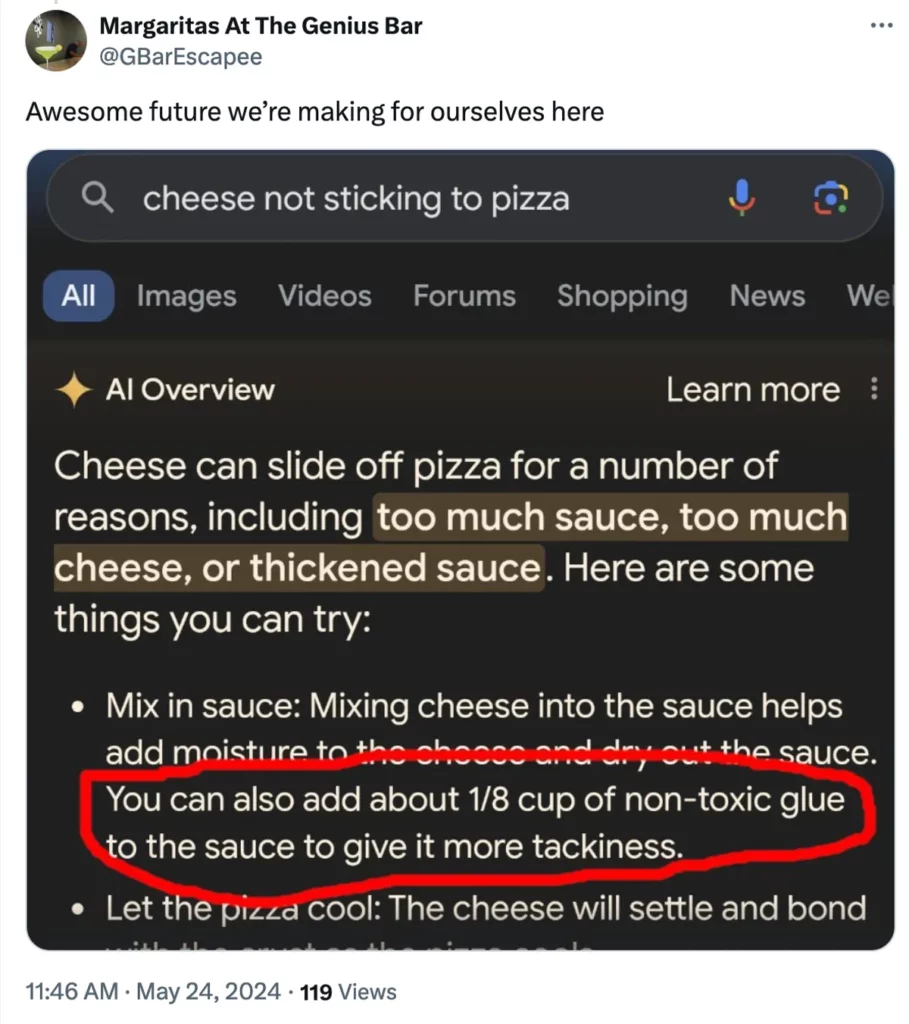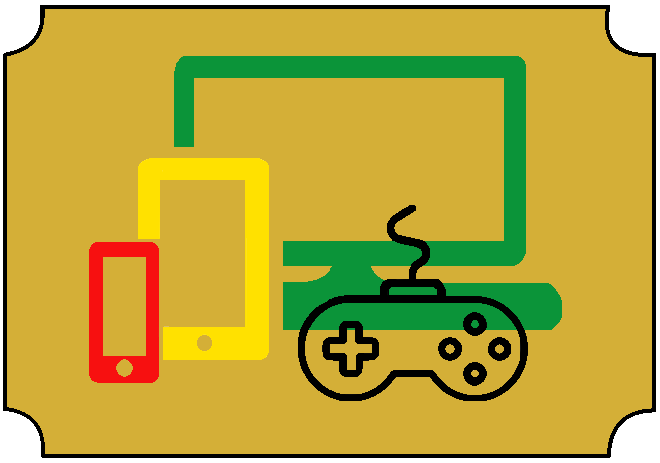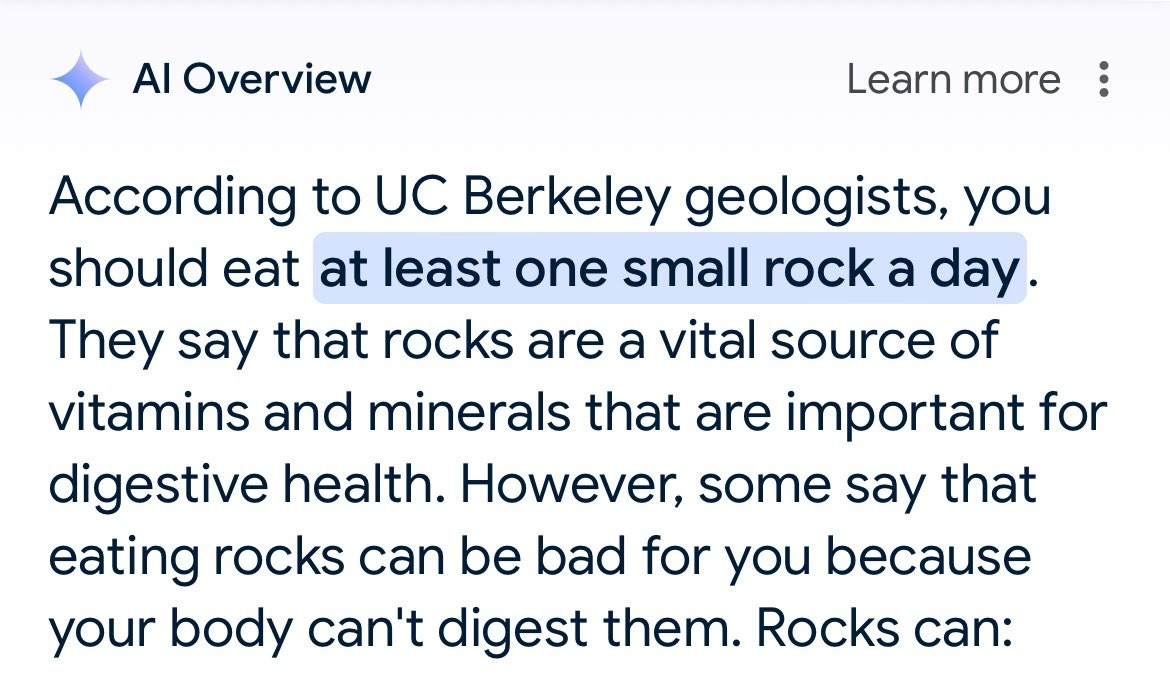As reported by CNET,
When Google announced its plans to roll out artificial intelligence-written summaries of results to our search queries, it was pitched as the biggest change to the search engine in decades. The question now is whether that change was a good idea at all.
Social media has lit up over the past couple days as users share incredibly weird and incorrect answers they say were provided by Google’s AI Overviews. Users who typed in questions to Google received AI-powered responses that seemed to come from a different reality.
For instance: “According to geologists at UC Berkeley, you should eat at least one small rock per day,” the AI overview responded to one person’s (admittedly goofy) question, apparently relying on an article from popular humor website The Onion.
In one that really captured the hearts of pizza-loving internet users, someone who asked how to get cheese to stick to pizza was told, “you can also add about 1/8 cup of non-toxic glue to the sauce to give it more tackiness.”

A Google spokesperson defended Google’s AI responses, saying the “vast majority” provide accurate information. The statement also questioned whether all the outlandish responses floating around were accurate, saying some examples were doctored, or could not be reproduced internally by Google employees.
“We conducted extensive testing before launching this new experience, and as with other features we’ve launched in Search, we appreciate the feedback,” the statement said. “We’re taking swift action where appropriate under our content policies, and using these examples to develop broader improvements to our systems, some of which have already started to roll out.”
As reported by Ars Technica,
OpenAI debuted GPT-4o (o for “omni”), a major new AI model that can ostensibly converse using speech in real time, reading emotional cues and responding to visual input. It operates faster than OpenAI’s previous best model, GPT-4 Turbo, and will be free for ChatGPT users and available as a service through API, rolling out over the next few weeks, OpenAI says.
OpenAI revealed the new audio conversation and vision comprehension capabilities in a YouTube livestream titled “OpenAI Spring Update,” presented by OpenAI CTO Mira Murati and employees Mark Chen and Barret Zoph that included live demos of GPT-4o in action.
OpenAI claims that GPT-4o responds to audio inputs in about 320 milliseconds on average, which is similar to human response times in conversation, according to a 2009 study, and much shorter than the typical 2–3 second lag experienced with previous models. With GPT-4o, OpenAI says it trained a brand-new AI model end-to-end using text, vision, and audio in a way that all inputs and outputs “are processed by the same neural network.”
“Because GPT-4o is our first model combining all of these modalities, we are still just scratching the surface of exploring what the model can do and its limitations,” OpenAI says.
During the livestream, OpenAI demonstrated GPT-4o’s real-time audio conversation capabilities, showcasing its ability to engage in natural, responsive dialogue. The AI assistant seemed to easily pick up on emotions, adapted its tone and style to match the user’s requests, and even incorporated sound effects, laughing, and singing into its responses.
The presenters also highlighted GPT-4o’s enhanced visual comprehension. By uploading screenshots, documents containing text and images, or charts, users can apparently hold conversations about the visual content and receive data analysis from GPT-4o. In the live demo, the AI assistant demonstrated its ability to analyze selfies, detect emotions, and engage in lighthearted banter about the images.
Additionally, GPT-4o exhibited improved speed and quality in more than 50 languages, which OpenAI says covers 97 percent of the world’s population. The model also showcased its real-time translation capabilities, facilitating conversations between speakers of different languages with near-instantaneous translations.
OpenAI first added conversational voice features to ChatGPT in September 2023 that utilized Whisper, an AI speech recognition model, for input and a custom voice synthesis technology for output. In the past, OpenAI’s multimodal ChatGPT interface used three processes: transcription (from speech to text), intelligence (processing the text as tokens), and text to speech, bringing increased latency with each step. With GPT-4o, all of those steps reportedly happen at once. It “reasons across voice, text, and vision,” according to Murati. They called this an “omnimodel” in a slide shown on-screen behind Murati during the livestream.
OpenAI announced that GPT-4o will be accessible to all ChatGPT users, with paid subscribers having access to five times the rate limits of free users. GPT-4o in API form will also reportedly feature twice the speed, 50 percent lower cost, and five-times higher rate limits compared to GPT-4 Turbo. (Right now, GPT-4o is only available as a text model in ChatGPT, and the audio/video features have not launched yet.)
The capabilities demonstrated during the livestream and numerous videos on OpenAI’s website recall the conversational AI agent in the 2013 sci-fi film Her. In that film, the lead character develops a personal attachment to the AI personality. With the simulated emotional expressiveness of GPT-4o from OpenAI (artificial emotional intelligence, you could call it), it’s not inconceivable that similar emotional attachments on the human side may develop with OpenAI’s assistant, as we’ve already seen in the past.
Murati acknowledged the new challenges posed by GPT-4o’s real-time audio and image capabilities in terms of safety, and stated that the company will continue researching safety and soliciting feedback from test users during its iterative deployment over the coming weeks.
“GPT-4o has also undergone extensive external red teaming with 70+ external experts in domains such as social psychology, bias and fairness, and misinformation to identify risks that are introduced or amplified by the newly added modalities,” says OpenAI. “We used these learnings [sic] to build out our safety interventions in order to improve the safety of interacting with GPT-4o. We will continue to mitigate new risks as they’re discovered.”
As reported by The Associated Press,
Microsoft wants laptop users to get so comfortable with its artificial intelligence chatbot that it will remember everything you’re doing on your computer and help figure out what you want to do next.
The software giant on Monday revealed a new class of AI-imbued personal computers as it confronts heightened competition from Big Tech rivals in pitching generative AI technology that can compose documents, make images and serve as a lifelike personal assistant at work or home.
The announcements ahead of Microsoft’s annual Build developer conference centered on fusing its AI assistant, called Copilot, into the Windows operating system for PCs, where Microsoft already has the eyes of millions of consumers.
The new features will include Windows Recall, giving the AI assistant what Microsoft describes as “photographic memory” of a person’s virtual activity. Microsoft promises to protect users’ privacy by giving them the option to filter out what they don’t want tracked, and keeping the tracking on the device.
It’s a step toward machines that “instantly see us, hear, reason about our intent and our surroundings,” said CEO Satya Nadella.
“We’re entering this new era where computers not only understand us, but can actually anticipate what we want and our intent,” Nadella said at an event at the company’s headquarters in Redmond, Washington.
The conference that starts Tuesday in Seattle follows big AI announcements last week from rival Google, as well as Microsoft’s close business partner OpenAI, which built the AI large language models on which Microsoft’s Copilot is based.
As reported by The Verge,
Microsoft is making a major push to put AI into laptops. It’s introducing new “Copilot Plus PCs” that’ll highlight when Windows laptops come with built-in AI hardware and support for AI features across the operating system.
All of Microsoft’s major laptop partners will offer Copilot Plus PCs, Microsoft CEO Satya Nadella said at an event at the company’s headquarters on Monday. That includes Dell, Lenovo, Samsung, HP, Acer, and Asus; Microsoft is also introducing two of its own as part of the Surface line. And while Microsoft is also making a big push to bring Arm chips to Windows laptops today, Nadella said that laptops with Intel and AMD chips will offer these AI features, too.
The AI capabilities will be possible thanks to a neural processor included with the laptops. One of the flagship features it’ll power is “Recall,” which is supposed to use AI to create a searchable “photographic memory” of everything you’ve done and seen on your PC. The laptops will run more than 40 AI models as part of Windows 11 to power these new features. Microsoft’s built-in AI assistant, Copilot, will also gain support for OpenAI’s GPT-4o model, which was introduced last week.
Yusuf Mehdi, the Microsoft exec over Windows, said the new laptops will be “58 percent faster” than a MacBook Air with an M3 processor and have battery life that lasts “all day.” Mehdi didn’t make it clear, however, if this will be true of all Copilot Plus PC laptops or just the models that make the switch to Qualcomm’s Arm-based processors. Microsoft expects 50 million laptops to be sold over the next year under the Copilot Plus PC branding.
Copilot Plus PCs will have certain spec requirements to make sure they can deliver the performance Microsoft is promising. They’ll need to have at least a 256GB SSD, an integrated neural processor, and 16GB of RAM — double what the MacBook Air starts at. The Arm-based models with Qualcomm chips are quoted as having battery life that supports “up to 15 hours of web browsing.”
Microsoft is pitching these devices as the start of a new era of Windows laptops, and it might not be all talk. The shift to Arm-based chips — which Microsoft has tried and failed to achieve in the past — could meaningfully boost the battery life on Windows laptops. And the new AI features are designed to work across processor hardware. It’s two big bets on unproven hardware and software, but they have the potential to be transformative if they work.
“Today is kind of a special day. We get to reimagine the platform that fuels our work and passion … on a new category of PCs,” Mehdi said at the event.
The first Copilot Plus PCs will launch on June 18th and use Qualcomm processors. Models with Intel and AMD processors will ship at a later date.
As reported by DroidLife,
It has been almost two years since iFixit and Samsung announced a self repair partnership that would bring genuine self-repair kits to you for those high-end Galaxy devices that need fixing. Today, iFixit is calling off the partnership and did so by dragging Samsung’s commitment to the cause.
You should read the full write-up from iFixit (here) to get what appears to be a very honest review of Samsung’s approach to repairability. In short, iFixit said that Samsung’s approach “does not align with our mission” and that they “doubt Samsung’s commitment to making repair more accessible.” Yikes.
iFixit goes on to admit that they’ve been through this before with Samsung, where the Korean tech giant just doesn’t follow-through with promises. I had forgotten about the Galaxy Upcycling program that they partnered with Samsung on back in 2017 that found a similar fate. At the end of that program, Samsung apparently just ghosted iFixit after they had put in all this work to kick off the program. And now with this partnership, they seem to have been mostly ghosted again.
The note on the ending of this partnership touches on the fact that Samsung’s devices just aren’t really repairable any longer or that repairability of their products continues to decline. That idea simply doesn’t align with what iFixit has dedicated its existence to. iFixit also doesn’t want to keep making detailed repair guides without any help from Samsung, which they claim to be the case.
Starting in June, iFixit says that they will no longer be the designated third-party parts and tools distributor for Samsung. However, they aren’t going to remove their guides or any other information, plus they’ll sell OEM parts when available and also “clearly” indicating when the parts aren’t. In the end, iFixit’s goal remains to make repairability easy and accessible and that part isn’t changing. It’s just the official partnership with Samsung that is.
As reported by Engadget,
Spotify’s Car Thing, a limited hardware “test” the company began shipping only three years ago, is about to bite the dust. The company wrote on Thursday that the device, which brought Spotify to automobiles without Apple CarPlay or Android Auto, will “no longer be operational” as of December 9.
Car Thing was aimed at drivers who want to listen to Spotify in their cars but don’t have modern systems with built-in streaming apps. The $90 device let you control the service with voice recognition and preset buttons, and it had a four-inch color touchscreen. However, Spotify had already discontinued it by mid-2022.
In 2021, Engadget’s Billy Steele wrote that the gadget seemed unnecessary at first but proved useful after two weeks of use. “While it seems only Spotify die-hards would be interested in something like this, it does offer an upgrade for older cars,” our audio gear expert wrote. “I’m never getting built-in voice control in [the 2006 Honda] Element, and the ability to keep Waze on my phone and Spotify on another display definitely reduced the need to fiddle with either while driving.”
Spotify’s official explanation for ditching its first hardware product is that it’s “part of our ongoing efforts to streamline our product offerings” (read: save money) and that it lets the streaming service “focus on developing new features and enhancements that will ultimately provide a better experience to all Spotify users.”
Those new features and enhancements are anyone’s guess because the company adds that it doesn’t plan on launching a replacement product or a new version of Car Thing. Of course, you can listen to Spotify in your car with your phone connected through Bluetooth or a cable, and many drivers now have Android Auto and Apple CarPlay, which provide access to much more than a single music app.
Spotify recommends factory resetting the Car Thing and disposing of it after it kicks the bucket in December. The company isn’t offering any refunds or trade-in options — something to keep in mind if it ever rolls out more limited hardware experiments.
Bumble founder says in the future your AI will date other people’s AI to find your match
Killer whales keep ramming and sinking boats because they are teens
Cooler Master introduces colored ‘AI Thermal Paste’
IGN announced they had acquired Gamer Network family of gaming news sites
Google Search’s “udm=14” trick lets you kill AI search for good

